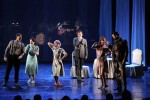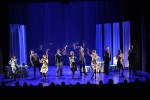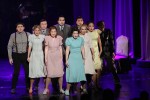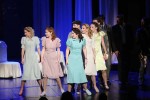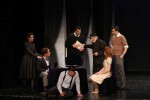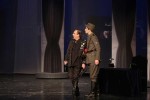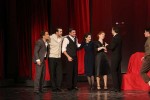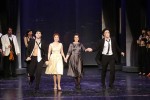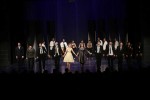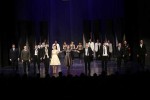11:00
11:00 Town Square
Concert: Classical music at 11
Belgrade Faculty of Music’s Students
 Faculty of Music, University of Arts in Belgrade is marking 79 years since its establishment in 2016. As the oldest higher education institution in the field of music pedagogy, is credited with laying the foundations of overall development of the system of musical education in Serbia. Today, with 1,044 students and nearly 200 teachers it is the largest in the region and their programs of study cover all specialties in the field of music.
Faculty of Music, University of Arts in Belgrade is marking 79 years since its establishment in 2016. As the oldest higher education institution in the field of music pedagogy, is credited with laying the foundations of overall development of the system of musical education in Serbia. Today, with 1,044 students and nearly 200 teachers it is the largest in the region and their programs of study cover all specialties in the field of music.
Studies are oriented towards training of professional musicians-performers and music educators, but also include the composition, musicology, ethnomusicology, combining the fields of art and social humanistic science. Teaching at undergraduate studies at the Faculty of Music is organized into sixteen study programs: Composition, Conducting, Solo Singing, Piano, String instruments (violin, viola, cello, double bass), Wind instruments (flute, oboe, clarinet, bassoon, horn , trumpet, trombone and tuba), musicology, music pedagogy, music theory, ethnomusicology, five study programs within Poly-instrumental section (harpsichord, harp, organ, guitar, percussion), and Jazz and popular music. The course consists of 26 study programs and it is organized at all levels of study: undergraduate, graduate and doctorate in the fields of arts and social sciences and humanities, and in the fields of music and performing arts, and the science of art. The most prominent Serbian artists are among the teachers. Their best students will present the program of The Days of Mokranjac – Classical music at 11. Joining the European practice of holding concerts in the open, they will present their skills, talent and irreplaceable energy of youth. We invite you to confirm the power of music to which they devoted their lives and visit their concerts in the central square in Negotin.
12:00
12:00 Krajina Cinema Stage
Science panel:
Work of Mokranjac in the light of contemporary liturgical music and artistic elements of the Orthodox East music
Lecturer: Bogdan Djakovic, PhD, musicologist
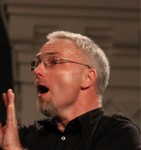 Bogdan Đaković, musicologist and choral conductor (Novi Sad, 1966) graduated from the Department of Musicology at the Faculty of Music in Belgrade. He received his MA with the theme Development of choral singing in Novi Sad between the two world wars (1918-1941), and defended his doctoral dissertation titled Functional and stylistic and aesthetic elements of the Serbian spiritual music of the first half of the twentieth century in 2013 at the Academy of Arts in Novi Sad, where he works as a full professor in the field of Knowledge of choral literature. In Novi Sad in 1987, he founded the Church Choir in Sveti Stefan of Decani, and then Choir of the cathedral St. George, which he still leads. Occasionally, he works with the Chamber Choir of the Academy of Arts in Novi Sad, and since 2009 with the Festival Choir of KotorArt (Montenegro). As an assistant of the academician Dimitrije Stefanovic since 1993, he has been participating in the work of the summer school of church music In memory of Cornelius. Since 2000 he is lecturer at these seminars. In 2014 he was guest conductor of one of the world’s finest vocal ensembles of old and new music, Cappella Romana from Portland (Oregon, USA), performing a series of evening concerts of Serbian spiritual music (Sacred Songs of Serbia). At the beginning of 2015 he held a workshop Orthodox Church Choral Music in Antwerp under the Belgian choral association Koor&Stem. He is intensively dedicated to the advancement of intercultural and interreligious dialogue. To this end, has developed cooperation with a number of European choirs, regularly participating in international meetings Christian youth TAIZE and by participating actively in the work of the European Choral Association Europa Cantat. He is the artistic director of the Festival Cantat Novi Sad.
Bogdan Đaković, musicologist and choral conductor (Novi Sad, 1966) graduated from the Department of Musicology at the Faculty of Music in Belgrade. He received his MA with the theme Development of choral singing in Novi Sad between the two world wars (1918-1941), and defended his doctoral dissertation titled Functional and stylistic and aesthetic elements of the Serbian spiritual music of the first half of the twentieth century in 2013 at the Academy of Arts in Novi Sad, where he works as a full professor in the field of Knowledge of choral literature. In Novi Sad in 1987, he founded the Church Choir in Sveti Stefan of Decani, and then Choir of the cathedral St. George, which he still leads. Occasionally, he works with the Chamber Choir of the Academy of Arts in Novi Sad, and since 2009 with the Festival Choir of KotorArt (Montenegro). As an assistant of the academician Dimitrije Stefanovic since 1993, he has been participating in the work of the summer school of church music In memory of Cornelius. Since 2000 he is lecturer at these seminars. In 2014 he was guest conductor of one of the world’s finest vocal ensembles of old and new music, Cappella Romana from Portland (Oregon, USA), performing a series of evening concerts of Serbian spiritual music (Sacred Songs of Serbia). At the beginning of 2015 he held a workshop Orthodox Church Choral Music in Antwerp under the Belgian choral association Koor&Stem. He is intensively dedicated to the advancement of intercultural and interreligious dialogue. To this end, has developed cooperation with a number of European choirs, regularly participating in international meetings Christian youth TAIZE and by participating actively in the work of the European Choral Association Europa Cantat. He is the artistic director of the Festival Cantat Novi Sad.
The aim of this paper (Wоrk of Mokranjac in the light of Contemporary Liturgical Music and Artistic Elements of the Orthodox East Music) is to point out the place of Mokranjac’s church choral music under the circumstances of the contemporary church music life (service and concert practice) in the whole world of the Orthodox Church (Russian, Greek, Finish, orthodox communities in USA), through stylistic and constructive elements, as well as through the modern tendency of neglecting the romantic and different other historical periods of this music genre, by giving support to the return of the traditional unanimous or “the traditional” chanting inside the expending new Byzantine theological ideas. Trying to define once more the “classical” values and position of Mokranjac’s legacy in the terms of the national Serbian church choral music genre, we are aware of the new theological-religious concepts of the church practise which sometimes can neglect the aesthetic and liturgical power of his art. Through explanation of this kind of issues as well as through process of witnessing the specific process of surviving Mokranjac’s music under the new circumstances, we can assure a interesting modern overview over his church choral music. The classical value between form and the content, between local and universal, together with the brilliant balance between the sacred and aesthetic elements, guarantee, if we may say, the over-historical dimension of the church choral music by Stevan Stojanovic Mokranjac.
13:00
13:00 Krajina Cinema Stage
Presentation of the documentary: Reaching the Immortality
Authors: Ana Djordjevic, Bojana Radovanovic, Milos Bralovic, Stefan Savic
 Guiding idea of the project 100 years later, which was first started in 2014 and is dedicated to the one hundredth anniversary of the death of Stevan Stojanović Mokranjac, was the overview of significance and influence of foundationalist, creative, and pedagogical work of the most important Serbian composer through interviews with numerous musicians and experts. Based on the interview material, the scenario for documentary film Reaching the Immortality was made. The authors are young musicologists, graduating from the Faculty of Music in Belgrade, together with Stefan Bognar, who is in charge for film-edition and postproduction.
Guiding idea of the project 100 years later, which was first started in 2014 and is dedicated to the one hundredth anniversary of the death of Stevan Stojanović Mokranjac, was the overview of significance and influence of foundationalist, creative, and pedagogical work of the most important Serbian composer through interviews with numerous musicians and experts. Based on the interview material, the scenario for documentary film Reaching the Immortality was made. The authors are young musicologists, graduating from the Faculty of Music in Belgrade, together with Stefan Bognar, who is in charge for film-edition and postproduction.
The motive for creating this documentary is a specific kind of apathy that affected the cultural public in Serbia for the last few years. Since there was no institutionally organized celebration of the anniversary, except the yearly held festival The Days of Mokranjac, we decided to contribute and give an impulse to similar actions and projects. Likewise, we explored the existing materials of this kind, and realized that in the past there was no greater attention given to the documentary type of cultural documents, which means that Reaching the Immortality is the unique undertaking in our culture.
It should be pointed out that we’ve had interviewed many appreciated professionals and musicians: academician Dejan Despić, Roksanda Pejović, Nadežda Mosusova; conductors – Mladen Jagušt, Bojan Suđić, Tamara Adamov Petijević; composers – Rajko Maksimović, Zoran Hristić, Vlastimir Trajković, Zoran Erić, Svetislav Božić, Aleksandar Vujić, Minta Aleksinački, etc; musicologists – Sonja Marinković, Tijana Popović Mlađenović, Ana Stefanović, etc. Having in mind the time limitation of a documentary film on the one hand, and, on the other, extensiveness of gathered material, we are planning a publication of complete interviews, in order to collect and share the abundance of information and ideas. The film scenario is based on the interview excerpts, divided in several thematic areas – Opus, Influence, Reception, and Marking the anniversary of the death.
Група аутора – Ана Ђорђевић, Бојана Радовановић, Милош Браловић, Стефан Савић – бележи неколико пројеката и достигнућа у свом заједничком раду. Међу њима су пројекат младих српских музиколога Како се сећамо „нашег“ Мокрањца? Репрезентације и рецепције Стевана Стојановића Мокрањца у српској култури XXI века, који је реализован на 49. Мокрањчевим данима у Неготину 2014. године у сарадњи са колегама са докторских студија музикологије ФМУ, објављивање заједничких радова у часопису Мокрањац на тему заступљености Стевана Мокрањца у градиву средњих школа (музичких, гимназија и других), учешће на 18. Педагошком форуму сценских уметности (2014) и објављивање радова у зборнику Форума, те презентације поводом најаве филма Довољно за бесмртност на самосталним предавањима, у оквиру студентских трибина (ФЕСТУМ, 2014) и на научним скуповима (Бања Лука, 2016).
Аутори се такође свесрдно и савесно баве прикупљањем, презервацијом нотног, видео и аудио материјала српских композитора, те њиховим објављивањем путем интернета. Наиме, ова група младих музиколога стоји иза првог канала на YouTube платформи који промовише музику искључиво српских композитора (види на: https://www.youtube.com/channel/UCIo2x4lsZwUA9O4YXa0uPGQ, Serbian Composers Channel) и прве странице која заступа достигнућа српске уметничке и филмске музике на друштвеној мрежи Facebook (види на: https://www.facebook.com/SerbianComposers/?fref=ts,Српски композитори / Serbian Composers) .
20:00
20:00 Cultural Centre
Goran Markovic
Little Secrets
Music: Zoran Simjanovic
A piece with acting, singing and dancing
Opera and Theatre Madlenianum
Text and Directing: Goran Markovic
Original music: Zoran Simjanovic
Set Design: Nebojsa Bradic
Costume Design: Dragana Ognjenovic
Choreographer: Mirko Knezevic
Light design: Srdjan Jovanovic
Director Assistant: Masa Neskovic
Set Assistant: Slavica Markovic
Author of the songs: Branko Stevanovic
CASTING
Erih Hecl…………………………………………….. Predrag Ejdus
Petar Radovanovic……………………………… Vojin Cetkovic
August Von Meistner…………………………. Tihomir Stanic
Dimitrije Stakic …………………………………. Srdjan Timarov
Joakim Vaserman……………………………….. Petar Bencina
Ankica Stankovic……………………………….. Andrijana Oliveric
Vidosava Vida Rosic………………………….. Branislava Podrumac
Dusan Stankovic………………………………… Miodrag Radonjic
Vukasin Tanaskovic……………………………. Milos Andjelkovic
Lazar Lazo Draco………………………………… Rade Cosic
Kristifor Kica Kaludjerovic………………… Andrija Kuzmanovic
Band Hot Club Belgrade:
Branko Macic, Vladimir Nikic, Filip Krumes, Milan Jeftic, Nebojsa Pesic, Nikola Dokic
Dance ensemble:
Helena Petrovic, Jelena Borovic, Irena Maksimovic
Stage manager Vesna Curcic Petrovic;
Organizer: Milena Moravčević;
Musical preparation: Dragana Andjelic Bunjac
Prompter: Jovana Djokic;
Recording music: Zoran Uzelac;
Audio realization: Dusan Arsikin
Video realization: Zvonimir Jelusic;
Realization of light: Vladimir Krunic
Stage Master: Milan Ćirić
Makeup and Hairstyles: Mirjana Rakic;
Wardrobe: Tanja Vuksanovic and Miladin Pavicevic
Little secrets on our stage
… The group of artists determined to establish a theatre in Belgrade, at the most difficult days, faces a pre-war turmoil, participate and act during the Second World War, prepares the play while bombs are falling over the occupied capital, when bare lives are saved, when people are praying, crying, struggling and reaching for a weapon. Period of German occupiers, spyware invasions, and the wealth of the spirit of miraculous patrons of the arts is a part of the story that follows with a series of characters, many of which are real and make the spinning drama, but also a love that grows in the midst of bloody events. Fate of the heroes are accompanied with a retrospective of our “popular” music, which at that time gained increasing popularity, and genre of the work, characterized as “a piece with singing”, follows this miraculous path of creation the theatrical piece, as well as theatre institutions in liberated Belgrade in parallel with the development of our music…
…Love and death, unusual character development, as well as the emergence of the theatre, the existence of people of all strata – the bourgeoisie and the rich, young communists, the German occupying forces, soldiers, beautiful, young girls – make a drama exciting and unexpected resolution. Music of that time makes this piece unique. When dramatic events reach a climax, then music talks and it was composed by Zoran Simjanović, one of our most prolific creators…
Branka Radovic, PhD
Author about the play
The subject of interest of this play is the theatre troupe, drama group that really existed, created before the World War II and acting during the war and after it, being the driving force of Belgrade Drama Theatre in its famous years and which broke up before the end of fifties, immediately after its taking part in creation of a new theatre – Atelier 212.
The way I am telling this story is appropriate for dramatic form: we will deal with individual destinies of its protagonists, but we will simultaneously observe what happens with society during that twenty-year period. Certainly, I am interested in the very phenomenon of the theatre and acting as the weirdest of all arts. That is why the actors are in the first plan, their lives, artistic development, intimacy, love troubles and everything that makes life behind a theatre curtain.
In parallel with the story development, the events will be accompanied by popular hits of the era. Perhaps it is worth mentioning that Little Secrets shall as well be a kind of the retrospective of pop music in the period from 1939, when our story begins, during the war and German occupation, up to 1958 when the series finishes. Maybe we should add a dance, an important segment of this kind of theatre expression. This combination gave birth to a genre that could be called a piece with singing and dancing. This is the closest benchmark. Little secrets are neither drama nor musical, but something else.
Goran Marković (1946, Belgrade) studied the film directing in Prague (1965-1970). Until 1976, he filmed documentaries for the needs of television program, and then began making feature films: Special Education, National Class, Masters, masters, Variola vera, Taiwan Canasta, Déjà vu, The Meeting Point, Tito and Me, Slapstick tragedy, Serbia year zero, Cordon, The Tour and Forger. He attempted to make the theatre carrier as a director in the plays: Market day by Aleksandar Popovic, Belgrade Trilogy by Biljana Srbljanovic, Orange Peel by Maja Pelević, Therapy by J. Cvetanovski and The Golden Calf by Iljfo and Petrov. He wrote theater plays: The Tour, Speech Flaw, Eighth Session, or Life is a dream, Couples, Villa Sachino, Pandora’s Box, Delirium tremens, Forger and Doctor D. The last four works he directed himself. He has published books: Czech school does not exist, Tito and Me, One Year, the Eighth Session and other plays, Little secrets and the Fictional life. Marković is a professor emeritus at Belgrade Faculty of Dramatic Arts.
Nebojša Bradić (1956, Trstenik) graduated at the Faculty of Scenic Art in Belgrade. From 1981 to 1996 he worked as director, art director and head of the Krusevac Theatre. He was the head of the Atelje 212 theatre from 1996 to 1997 and the head director of the National Theatre from 1997 till 1999, and from year 2000 till 2008, he was the manager and the artistic director of the Belgrade Drama Theatre. He was the Minister of Culture and Information in the Government of Serbia from July 7th 2008 till March 14th 2011. He has directed more than 80 plays in Serbian, Croatian, Slovenian, Bosnian and Greek theatres, with special affinity towards contemporary domestic literature and dramatization (The Damned Yard, The Dervish and Death, The Golden Fleece, The Roots, The Fortress, The Last Sailing). He has directed operas and musicals (Nana, Carmen, Les Miserable, Rebecca, and Spring Awakening). Theatre shows by Nebojsa Bradic were performed in theatres throughout the former Yugoslavia, Europe and the United States. He is founder of the Belgrade Dance Festival and the Danube Fest. He is the author of dramas: My Brother and Night in the pub Titanic. He worked in set design of opera, ballet and drama performances. He is the author of numerous essays on theater and literature. He was a professor of acting at the Belgrade Academy of Fine Arts. He is the recipient of important Serbian and international theatre awards. He won nine awards as director at the Joakim Vujic Theatre Festival and the Sterija Awards for best modern theatre adaptation, dramatization and directing, award for best director at the International Festival Joakiminterfest and International classics festival in Vrsac, the ring with the image of Joakim Vujic for outstanding contribution to the Principality-Serbian theater, Golden Knight for direction of The Golden Fleece by B.Pekić in Moscow, an award for the dramatization of the play The Dervish and Death by Mesa Selimovic in Istanbul, etc.
The word of the composer
When Goran told me he wanted to make Little secrets as a piece with singing (we think it is ideal for Serbia), we immediately entered the discussion about what music is that which extends from 1939 to the sixties of the 20th century. At first we thought that those should be popular songs of the time, and then we decided to make the original compositions similar to the music of that time, which could at the same time be hits sang nowadays. We needed the songwriter and we found him in great poet Branko Stefanovic. I’ve thought about the orchestra that plays that kind of music, starting from Django Renart and Grapelija, to sixties’ rock and roll. That orchestra is The Hot Club of Belgrade, and when we found all that, we rounded the idea. I tried to make music pop music, but also to be related with the action of the play. You will see for yourself if I succeeded.
Zoran Simjanović (1946, Belgrade) graduated at the Belgrade Faculty of Music Art. He started to deal with rock music early and he founded and played in some of the most recognized rock bands (Siluete, Elipse). Since 1975, he has been dealing with scenic music. Most of his work is electronic-based, with folk motifs and rock music. He has written music scores for 65 feature films, 45 theatre plays, more than 50 TV films and TV series, and more than 500 advertising films and clips. He won many awards in all of these areas. Feature films he wrote music for have been awarded at all important festivals worldwide (Cannes, Venice, Montreal, Manila, San Sebastian, Valencia, Corse, Istanbul, etc.). He composed scores for all Belgrade theatres, as well as for the musical plays Joys of Belgrade and The Fish in the Sea and several cabarets. With Paolo Magelli he worked on the Paris version of Machiavelli’s The Mandrake. Since 1993 he has been a professor of applied music at the Faculty of Scenic Arts in Belgrade. From 1999 to 2002 he was giving lectures in the same field at the Academy of Music Art in Belgrade, and from 2000 to 2002 at the Faculty of Scenic Arts in Cetinje, Montenegro. He also lectured at Dunav Film School, Post-Secondary School of Electrical Engineering and Braća Karić Academy of Fine Arts, as well as at the Art Academy in Banja Luka.
In 2002 he was given the Award of the City of Belgrade for Radio, Television and Film Making (for the music score in the feature film Cordon by Goran Markovic and the CD box entitled One Theme – One Film) He was awarded by the Association of Film Critics FIPRESCI Award for best music for the feature films The Tour and The Forger by Goran Markovic (2009 and 2013), and in 2012 at the Palic European Film Festival he won the award Lifka. In 2014 festival Cinema City awarded him the prize for his contribution to the film industry (awarded at the concert Pictures from films in Novi Sad on the occasion of centenary of death of Stevan Mokranjac). In 2013, at the concert in Sava Centre, organized on the occasion of a century of Serbian Film, his composition Pictures from films composed specially for the choir Collegium Musicum was performed. The Belgrade Philharmonic Orchestra in a New Year concert performed his composition, specially written for the occasion, Film suite with 15 movements (films). His symphony New Ideas had its premiere at Kalemegdan (Belgrade Fortress) and it is the first symphony to be written and performed in the independent Republic of Serbia. He is a member of the European Film Academy (EFA) and also a member of ASIFA (International animated film association) and SACEM (French Association of Music Composers).


